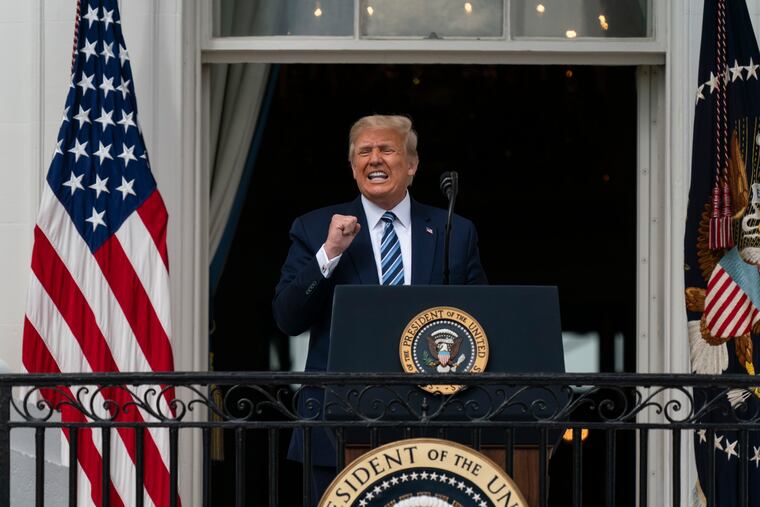Trump said he was ‘immune’ to the coronavirus. Here’s what the science says.
Even Twitter says President Trump's claim of immunity is misleading.

Twitter on Sunday slapped a warning on President Donald Trump’s tweet that he can’t get or give the coronavirus, saying the post violated rules "about spreading misleading and potentially harmful information related to COVID-19.”
Is there any evidence that the president is immune? And even if he is, could he still be infectious? Let’s look at what is known — and unknowable.
What is the scientific definition of ‘immunity?’
It means your immune system produces proteins, called antibodies, against a specific disease. Natural immunity can be acquired either by getting the disease or through vaccination, according to the U.S. Centers for Disease Control and Prevention. COVID-19 vaccines are still in development.
However, antibodies are only one part of the body’s defense system, and many diseases do not confer complete, permanent immunity. Seasonal influenza viruses, for example, continually mutate, so antibodies against one strain may not work against another strain. That’s why you should get the annual flu shot, which is tailored to circulating strains.
Because the coronavirus is so new, experts cannot yet say what level of antibodies are protective, or for how long. Extrapolating from other cold-causing coronaviruses, infection with the new SARS-CoV-2 is believed to confer protection from reinfection for at least three months.
» READ MORE: Organ-by-organ, see how the coronavirus can attack the body
How does Trump know he’s immune?
Trump has offered no evidence to back up his claim of immunity. Nor has his White House physician, Sean P. Conley.
Ever since the president disclosed his COVID-19 diagnosis on Oct. 2, experts have tried to parse his behavior and the limited information released by the White House to judge the severity of his illness and whether he has recovered. He spent three nights in Walter Reed National Military Medical Center and was given, among other drugs, an experimental monoclonal antibody and a steroid usually reserved for severe cases.
In a lengthy interview with Fox News on Sunday, Trump said, "It looks like I’m immune for, I don’t know, maybe a long time, maybe a short time, it could be a lifetime, nobody really knows — but I’m immune.”
Even if the president has some immunity, could he still be contagious to others?
The CDC says people with mild to moderate COVID-19 remain infectious and should quarantine up to 10 days after onset of symptoms. However, the agency adds, infectious virus has been documented between 10 and 20 days after symptom onset in people with severe COVID-19.
Trump is believed to have contracted his illness during the Sept. 26 Rose Garden introduction of his Supreme Court nominee. At least 11 people who attended the event, including first lady Melania Trump, have tested positive, and Anthony Fauci, a member of the White House coronavirus task force, has called it a “superspreader event."
Trump has consistently resisted precautions such as wearing a mask, a precaution used to limit the spread of the virus; face coverings were conspicuously absent at the Rose Garden event.
Since it is unclear when Trump’s symptoms began, it is unclear when he marked 10 days from that point. And if his illness was severe, he might be infectious beyond 10 days. That may be why Twitter flagged his tweet as “spreading misleading and potentially harmful information.”
Conley, the White House physician, on Thursday issued an update that said Trump would be 10 days out from symptom onset on Saturday: “In addition to the president meeting CDC criteria for the safe discontinuation of isolation, this morning’s COVID P.C.R. [test] sample demonstrates, by currently recognized standards, he is no longer considered a transmission risk to others.”
Could the president get reinfected?
Again, no one knows for sure. Four cases of reinfection have been confirmed worldwide, and another case was published in Lancet Infectious Diseases on Monday evening. The Lancet study confirms the first case of COVID-19 reinfection in the United States
Experts now know that, contrary to early assumptions, the coronavirus can be transmitted by people with no symptoms and in microscopic airborne droplets.
The CDC says: "Additional research is ongoing. Therefore, if a person who has recovered from COVID-19 has new symptoms, the person may need an evaluation for reinfection, especially if the person has had close contact with someone infected with COVID-19.”